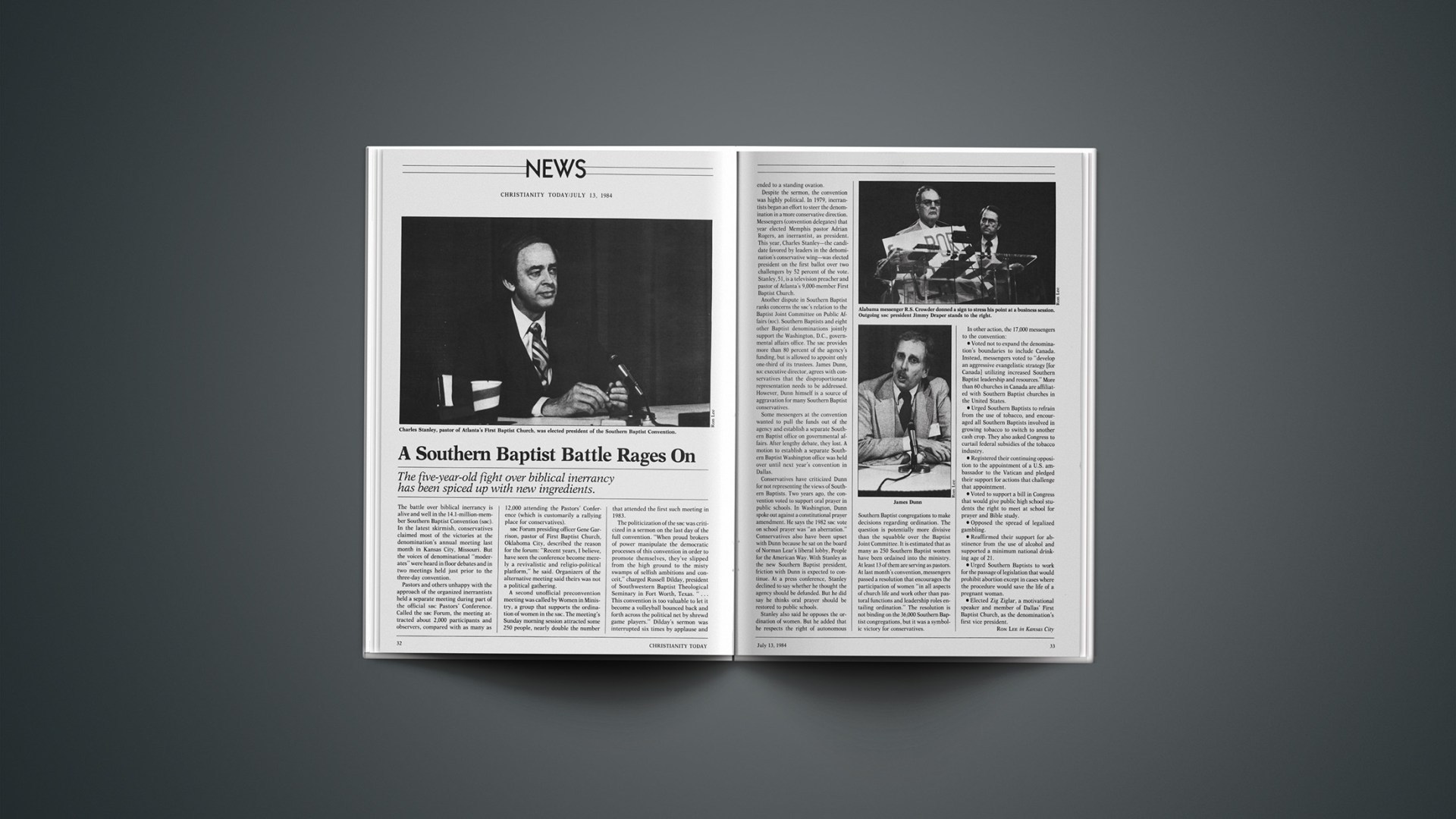The five-year-old fight over biblical inerrancy has been spiced up with new ingredients.
The battle over biblical inerrancy is alive and well in the 14.1-million-member Southern Baptist Convention (SBC). In the latest skirmish, conservatives claimed most of the victories at the denomination’s annual meeting last month in Kansas City, Missouri. But the voices of denominational “moderates” were heard in floor debates and in two meetings held just prior to the three-day convention.
Pastors and others unhappy with the approach of the organized inerrantists held a separate meeting during part of the official SBC Pastors’ Conference. Called the SBC Forum, the meeting attracted about 2,000 participants and observers, compared with as many as 12,000 attending the Pastors’ Conference (which is customarily a rallying place for conservatives).
SBC Forum presiding officer Gene Garrison, pastor of First Baptist Church, Oklahoma City, described the reason for the forum: “Recent years, I believe, have seen the conference become merely a revivalistic and religio-political platform,” he said. Organizers of the alternative meeting said theirs was not a political gathering.
A second unofficial preconvention meeting was called by Women in Ministry, a group that supports the ordination of women in the SBC. The meeting’s Sunday morning session attracted some 250 people, nearly double the number that attended the first such meeting in 1983.
The politicization of the SBC was criticized in a sermon on the last day of the full convention. “When proud brokers of power manipulate the democratic processes of this convention in order to promote themselves, they’ve slipped from the high ground to the misty swamps of selfish ambitions and conceit,” charged Russell Dilday, president of Southwestern Baptist Theological Seminary in Fort Worth, Texas. “… This convention is too valuable to let it become a volleyball bounced back and forth across the political net by shrewd game players.” Dilday’s sermon was interrupted six times by applause and ended to a standing ovation.
Despite the sermon, the convention was highly political. In 1979, inerrantists began an effort to steer the denomination in a more conservative direction. Messengers (convention delegates) that year elected Memphis pastor Adrian Rogers, an inerrantist, as president. This year, Charles Stanley—the candidate favored by leaders in the dehomination’s conservative wing—was elected president on the first ballot over two challengers by 52 percent of the vote. Stanley, 51, is a television preacher and pastor of Atlanta’s 9,000-member First Baptist Church.
Another dispute in Southern Baptist ranks concerns the SBC’S relation to the Baptist Joint Committee on Public Affairs (BJC). Southern Baptists and eight other Baptist denominations jointly support the Washington, D.C., governmental affairs office. The SBC provides more than 80 percent of the agency’s funding, but is allowed to appoint only one-third of its trustees. James Dunn, BJC executive director, agrees with conservatives that the disproportionate representation needs to be addressed. However, Dunn himself is a source of aggravation for many Southern Baptist conservatives.
Some messengers at the convention wanted to pull the funds out of the agency and establish a separate Southern Baptist office on governmental affairs. After lengthy debate, they lost. A motion to establish a separate Southern Baptist Washington office was held over until next year’s convention in Dallas.
Conservatives have criticized Dunn for not representing the views of Southern Baptists. Two years ago, the convention voted to support oral prayer in public schools. In Washington, Dunn spoke out against a constitutional prayer amendment. He says the 1982 SBC vote on school prayer was “an aberration.” Conservatives also have been upset with Dunn because he sat on the board of Norman Lear’s liberal lobby, People for the American Way. With Stanley as the new Southern Baptist president, friction with Dunn is expected to continue. At a press conference, Stanley declined to say whether he thought the agency should be defunded. But he did say he thinks oral prayer should be restored to public schools.
Stanley also said he opposes the ordination of women. But he added that he respects the right of autonomous Southern Baptist congregations to make decisions regarding ordination. The question is potentially more divisive than the squabble over the Baptist Joint Committee. It is estimated that as many as 250 Southern Baptist women have been ordained into the ministry. At least 13 of them are serving as pastors. At last month’s convention, messengers passed a resolution that encourages the participation of women “in all aspects of church life and work other than pastoral functions and leadership roles entailing ordination.” The resolution is not binding on the 36,000 Southern Baptist congregations, but it was a symbolic victory for conservatives.
In other action, the 17,000 messengers to the convention:
• Voted not to expand the denomination’s boundaries to include Canada. Instead, messengers voted to “develop an aggressive evangelistic strategy [for Canada] utilizing increased Southern Baptist leadership and resources.” More than 60 churches in Canada are affiliated with Southern Baptist churches in the United States.
• Urged Southern Baptists to refrain from the use of tobacco, and encouraged all Southern Baptists involved in growing tobacco to switch to another cash crop. They also asked Congress to curtail federal subsidies of the tobacco industry.
• Registered their continuing opposition to the appointment of a U.S. ambassador to the Vatican and pledged their support for actions that challenge that appointment.
• Voted to support a bill in Congress that would give public high school students the right to meet at school for prayer and Bible study.
• Opposed the spread of legalized gambling.
• Reaffirmed their support for abstinence from the use of alcohol and supported a minimum national drinking age of 21.
• Urged Southern Baptists to work for the passage of legislation that would prohibit abortion except in cases where the procedure would save the life of a pregnant woman.
• Elected Zig Ziglar, a motivational speaker and member of Dallas’ First Baptist Church, as the denomination’s first vice president.
RON LEEin Kansas City










